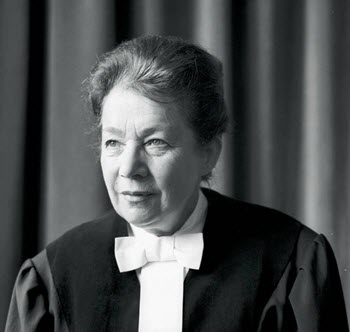Erna Scheffler (1893-1983) was a German senior judge who served three terms as a Federal Judge; from 1951 to 1963.
 She got her JD at a time when women were not allowed to practise law in Germany, and she was later banned from practising law by the Nazis due to being considered non-aryan.
She got her JD at a time when women were not allowed to practise law in Germany, and she was later banned from practising law by the Nazis due to being considered non-aryan.
After the end of World War II, Scheffler resumed her legal career with firm dedication. She was appointed Federal Judge on 7 September 1951, becomming the only female judge in the German Federal Constitutional Court in Karlsruhe. She served as a judge there until her third tem ended in 1963. Thereafter, she served as an expert for the Interior Committee of the German Bundestag and was a member of the Permanent Deputation of German Jurists.
Scheffler is especially renowned for her writings and opinions regarding family and gender equality principles. Examples of legal issues that have been decisively influenced by her pronouncements in Germany are equality of the man and woman in the family unit (see BverfGE 3, 225) and equality in social security law (see BverfGE 17, 1, 38, 62.
Early life
Erna Friedental was born on 21 September 1893 in Wrocław (German: Beslau). Today, Wrocław is a part of Poland, but when she was born the city was included in the German Empire.
Friedental attended schools for girls in Legnica and Wrocław.
University years
In 1911, Friedental gained her baccalaureate in Racibórz, after which she spent one semester studying medicine at Heidelberg University. She then switched from medicine to law, which she studied in Wrocław, Munich and Berlin. In 1914, she recieved her law doctorate from Wrocław.
Early career
When Friedental recieved her JD, women were not allowed to practise law in Germany, regardless of their formal qualifications, and this also ment that Friedental was prohibited from taking the state legal exams. Friedental therefore started working in social welfare instead, and then became an assistant at a law practice.
Occupied Belgium
In 1916, Erna Friedental married and changed her last name to Haßlacher. Until the end of World War I, she lived with her husband in Belgium, where he worked as a lawyer in the German civil administration of occupied Belgium. While in Belgium, she worked as an auxiliary officer.
The Wiemar Republic
After the end of the war, Erna Haßlacher worked at various law firms and for the Bund Deutscher Architekten (Association of German Architects). In the early 1920s, the law was finally changed – under the Weimar Republic – so she could take the German law exams. After taking the exams, she was a clerk for a few years, before becoming a full lawyer in 1925.
Before becoming a full lawyer, she divorced her husband.
Working as a lawyer
From late 1925 to 1928, she worked as a lawyer in the Berlin district courts I, II and III, and in the Berlin-Mitte district court.
In 1932, she became a permanent relife worker at the Berlin-Mitte district court.
Nazi Germany
Adolf Hitler was sworn in as Chancellor on the morning of 30 January 1933. In November that year, Erna Haßlacher was declared non-Aryan and recieved an employment ban backdated to 1 March 1933. She also recieved a pension, but it was small.
Erna wanted to marry her fiance George Scheffler, but the couple’s request to marry was denied in 1934 since she had been declared Halbjüdin (half-Jewish).
During World War II, she worked as an accountant in a friend’s business and distributed food.
During the final part of the war, from January 1945 and onwards, she hid in a small gardenhouse outside Berlin.
After World War II
When the war was over, Erna and George could finally marry each other, and Erna could start working as a lawyer again. The German Instrument of Surrender was signed at Reims on 7 May 1945, and that same month Erna returned to her judicial work. Erna Scheffler worked first as a Regional Councillor and then as a Regional Director of the Regional Court of Berlin (Landgericht Berlin).
In 1949, Erna Scheffler became a Councillor in the Düsseldorf Administrative Court (Verwaltungsreicht).
Federal Judge
In 1950, Scheffler held a speech on equality between men and women. After this, she was recommended as a Federal Judge.
Scheffler was appointed Federal Judge on 7 September 1951, becomming the only female judge in the German Federal Constitutional Court in Karlsruhe. She served as a judge there until her third tem ended in 1963.
From 1963, she was an expert for the Interior Committee of the German Bundestag.
Death
Erna Scheffler died in her daughter’s house in London, UK on 22 May 1983, almost 90 years old.
